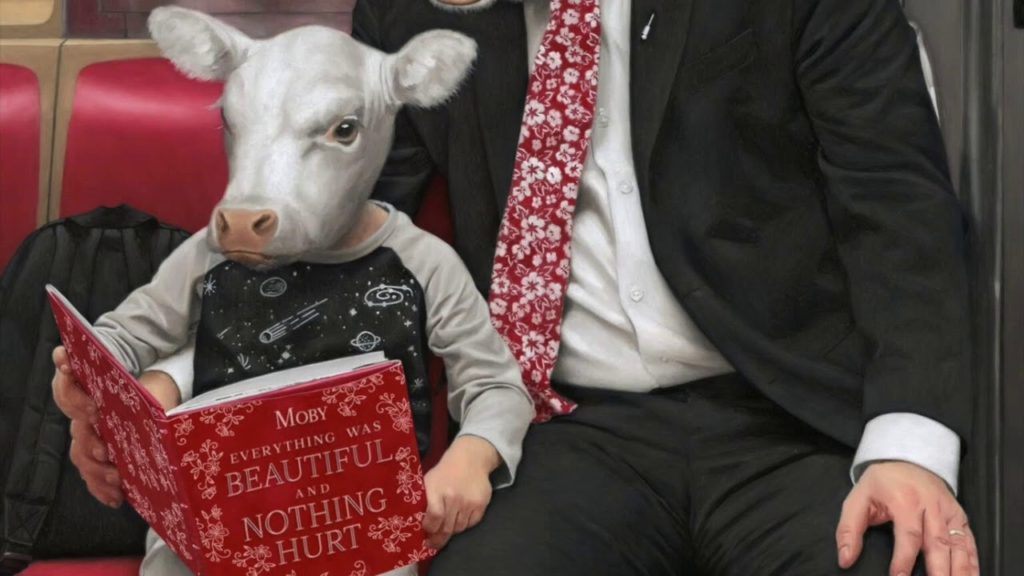Moby's Everything Was Beautiful and Nothing Hurt Echoes April CD of the Month.
by John Diliberto 4/2/2018
 If you thought that Moby got his angst out on his last two albums, These Systems Are Failing and More Fast Songs About the Apocalypse, you’d be right, in terms of energy matched with anger. But on Everything was Beautiful and Nothing Hurt, he goes deeper into his pain and remorse about the state of the world. Follow Moby on Twitter and other social media, and you’ll know that he’s vegan, loves animals, and hates the current political state of the US. It’s that last thing that comes out in this album.
If you thought that Moby got his angst out on his last two albums, These Systems Are Failing and More Fast Songs About the Apocalypse, you’d be right, in terms of energy matched with anger. But on Everything was Beautiful and Nothing Hurt, he goes deeper into his pain and remorse about the state of the world. Follow Moby on Twitter and other social media, and you’ll know that he’s vegan, loves animals, and hates the current political state of the US. It’s that last thing that comes out in this album.
Everything was Beautiful and Nothing Hurt seems like an idyllic, hopeful title, maybe an image of the afterlife, but the album couldn’t be further from that. The title is a quote from Kurt Vonnegut’s Slaughterhouse-Five where the protagonist, Billy Pilgrim, delivers that line to his daughter, who is asking about the war. As he says it, he thinks it would be a good epitaph. But with the Dresden firebombing, prisoner of war camp, and alien abduction, things were pretty awful for Pilgrim. Moby believes things are pretty awful for us right now.
Yet, despite its foreboding themes, Everything was Beautiful and Nothing Hurt is a beautiful album, full of haunting, melancholy melodies, deeply textural arrangements and more of those great guest singers Moby discovers, including Julie Mintz, Mindy Jones, Raquel Rodriguez and Apollo Jane.
 Moby draws upon two sources for his imagery. The first is the W.B. Yeats poem, “The Second Coming,” written in the malaise and uncertainty following the First World War, and the beginning of the Irish War of Independence. Themes from the work populate the album, which begins with “Mere Anarchy,” a phrase from the poem. It’s a heartbreaking anthem for the end. It begins in muted tones as sounds move in reverse and Moby sing/speaks in a hushed, husky delivery that he employs on much of the album. It’s partly vulnerable and slightly sinister, as if he’s seen too many horrors and smoked too many cigarettes. (He doesn’t smoke.) But the piece quickly accelerates into a pounding, symphonic groove, surging toward annihilation.
Moby draws upon two sources for his imagery. The first is the W.B. Yeats poem, “The Second Coming,” written in the malaise and uncertainty following the First World War, and the beginning of the Irish War of Independence. Themes from the work populate the album, which begins with “Mere Anarchy,” a phrase from the poem. It’s a heartbreaking anthem for the end. It begins in muted tones as sounds move in reverse and Moby sing/speaks in a hushed, husky delivery that he employs on much of the album. It’s partly vulnerable and slightly sinister, as if he’s seen too many horrors and smoked too many cigarettes. (He doesn’t smoke.) But the piece quickly accelerates into a pounding, symphonic groove, surging toward annihilation.
He also draws from his own dormant Christian background for much of his metaphorical imagery, and sometimes music, to explore these emotions of a world coming apart. “Like a Motherless Child” takes the black spiritual from the early days of American slavery and turns it into a thumping invective, sung by Raquel Rodriquez, with Moby giving a slightly British-accented rap of doom in the middle.
“A Dark Cloud is Coming,” sung by Apollo Jane in a deep, soulful, gospel blues cadence, sounds like it could also be an old hymn. She actually calls out to the Lord in this apocalyptic plea. It’s a somber end to the album, but not as somber as “The Middle Is Gone”. The title is another Yeats “Second Coming” reference to his famous line “Things fall apart; the centre cannot hold.” It reads like a suicide note, as Moby intones words of despair, failure and remorse, in a listless – there is no hope – kind of voice. Notably, this phrase was used as the title to Elyn R. Saks’ book about her own madness and attempted suicide.
I don’t think Moby is giving up. But he has written a beautiful, evocative and provocative song-cycle for those distraught by these times, when many of our social and political beliefs are under assault. Everything was Beautiful and Nothing Hurt, is an album for these troubled times, replete with gospel choirs shouting “In this darkness, please light my way.”
